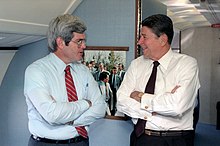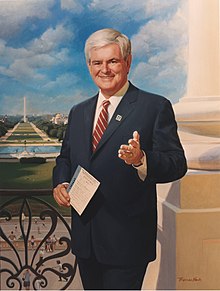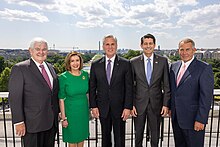Newt Gingrich
Newton Leroy Gingrich (/ˈɡɪŋɡrɪtʃ/; né McPherson; born June 17, 1943) is an American politician and author who served as the 50th speaker of the United States House of Representatives from 1995 to 1999.
[37] Although the district was trending Republican at the national level, conservative Democrats continued to hold most local offices, as well as most of the area's seats in the General Assembly, well into the 1980s.
[39] Gingrich supported a proposal to ban loans from the International Monetary Fund to Communist countries and he endorsed a bill to make Martin Luther King Jr. Day a new federal holiday.
[41] Ronald Reagan adopted the "opportunity society" ideas for his 1984 re-election campaign, supporting the group's conservative goals on economic growth, education, crime, and social issues.
[47] Early in his role as Whip, in May 1989, Gingrich was involved in talks about the appointment of a Panamanian administrator of the Panama Canal, which was scheduled to occur in 1989 subject to U.S. government approval.
[50] In 1990, after consulting focus groups[51] with the help of pollster Frank Luntz,[52] GOPAC distributed a memo with a cover letter signed by Gingrich titled "Language, a Key Mechanism of Control", that encouraged Republicans to "speak like Newt".
The deal was supported by the President and Congressional leaders from both parties after long negotiations, but Gingrich walked out during a televised event in the White House Rose Garden.
Long-time House minority leader Bob Michel of Illinois had not run for re-election, giving Gingrich, the highest-ranking Republican returning to Congress, the inside track at becoming Speaker.
[66] A number of scholars have credited Gingrich with playing a key role in undermining democratic norms in the United States, and hastening political polarization and partisan prejudice.
[74][75][76][53] University of Maryland political scientist Lilliana Mason identified Gingrich's instructions to Republicans to use words such as "betray, bizarre, decay, destroy, devour, greed, lie, pathetic, radical, selfish, shame, sick, steal, and traitors" about Democrats as an example of a breach in social norms and exacerbation of partisan prejudice.
Hopkins notes that Gingrich's view[73] directly contradicted the conventional wisdom of politics... that parties in a two-party system achieve increasing electoral success as they move closer to the ideological center... Gingrich and his allies believed that an organized effort to intensify the ideological contrast between the congressional parties would allow the Republicans to make electoral inroads in the South.
They worked energetically to tie individual Democratic incumbents to the party's more liberal national leadership while simultaneously raising highly charged cultural issues in Congress, such as proposed constitutional amendments to allow prayer in public schools and to ban the burning of the American flag, on which conservative positions were widely popular – especially among southern voters.
[73] According to University of Texas political scientist Sean M. Theriault, Gingrich had a profound influence on other Republican lawmakers, in particular those who served with him in the House, as they adopted his obstructionist tactics.
[97] Gingrich shut down the highly regarded Office of Technology Assessment, and relied instead on what the Bulletin of the Atomic Scientists called "self-interested lobbyists and think tanks".
Republican amendments would have limited appeals by death-row inmates, made it harder to issue health, safety and environmental regulations, and would have committed the president to a seven-year balanced budget.
[101] That perception developed after the trip when Gingrich, while being questioned by Lars-Erik Nelson at a Christian Science Monitor breakfast, said that he was dissatisfied that Clinton had not invited him to discuss the budget during the flight.
"[112] In a 2011 op-ed in The Washington Post, Gingrich said that the government shutdown led to the balanced-budget deal in 1997 and the first four consecutive balanced budgets since the 1920s, as well as the first re-election of a Republican majority since 1928.
On July 16, Paxon offered to resign his post, feeling that he had not handled the situation correctly, as the only member of the leadership who had been appointed to his position – by Gingrich – instead of elected.
[123][124][125] In 1998, Gingrich's private polls had given his fellow Republicans the impression that pushing the Clinton–Lewinsky scandal would damage Clinton's popularity and result in the party winning a net total of six to thirty seats in the House of Representatives.
[130] Writing a retrospective on his career at that point, The New York Times in November 1998 described Gingrich as "an expert in how to seize power, but a novice in holding it" further opining that he "illustrate[d] how hard it is for a radical, polarizing figure to last in leadership".
[136] Gingrich also co-chaired an independent congressional study group made up of health policy experts formed in 2007 to evaluate the strengths and weaknesses of action taken within the U.S. to fight Alzheimer's disease.
[150] Gingrich founded Advocates for Opioid Recovery together with former Rep. Patrick J. Kennedy and Van Jones, a former domestic policy adviser to President Barack Obama.
"[161] In January 2012, he said that he could not make public his contract with Freddie Mac, even though the company gave permission, until his business partners in the Center for Health Transformation also agreed to that.
[170] However, insisting that he had "pretty strongly" considered running,[171] on September 29 spokesman Rick Tyler said that Gingrich would not seek the presidency in 2008 because he could not continue to serve as chairman of American Solutions if he did so.
[182] Describing his views as a possible candidate during an appearance on On the Record with Greta Van Susteren in March 2009, Gingrich said, "I am very sad that a number of Republicans do not understand that this country is sick of earmarks.
[195][196] After the field narrowed with the withdrawal from the race of Huntsman and Rick Perry, Gingrich won the South Carolina Republican primary on January 21, obtaining about 40% of the vote, considerably ahead of Romney, Santorum and Paul.
[212] Gingrich later hosted a number of policy workshops at the GOP Convention in Tampa presented by the National Republican Committee called "Newt University".
He stated that he didn't have the interest in serving in any role related to the Trump administration, stressing that as a private citizen he would engage with individuals for "strategic planning" rather than job-seeking.
[266] Following the divorce, Jackie had to raise money from friends in her congregation to help her and the children make ends meet; she later filed a petition in court stating that Newt had failed to properly provide for his family.
[298] Gingrich wants the U.S. to pursue new achievements in space, including sustaining civilizations beyond Earth,[299] but advocates relying more on the private sector and less on the publicly funded NASA to drive progress.






















